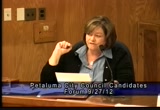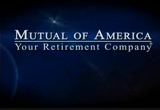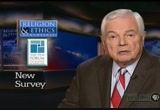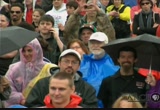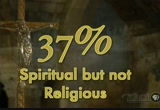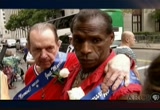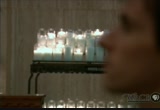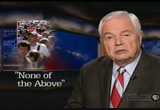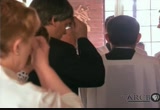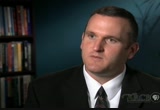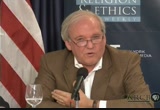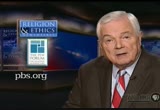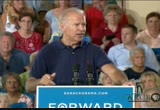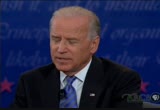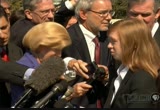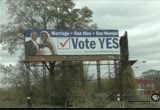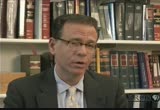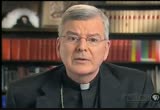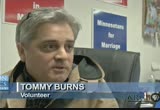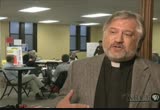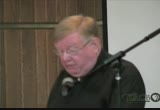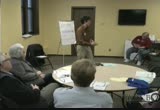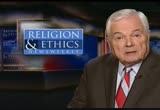tv Religion Ethics Newsweekly PBS October 14, 2012 10:00am-10:30am PDT
10:00 am
coming up -- the 1 in 5 americans, 46 million, who say they have no affiliation with any religious organization. we have results and analysis of our new survey with the pew research center. what does this fast growing group mean for american religious life? also, this election season, a vigorous battle in minnesota over same sex marriage.
10:01 am
should the state constitution be amended to define marriage as only between a man and a woman? fred de sam lazaro tells the story. welcome, i'm bob abernethy. it's good to have you with us as we begin today a three-part series we call "none of the above. it's about the fast-rising number of people in this country
10:02 am
who say they have no affiliation with any particular religion. according to a new survey released this week by the pew research center's forum on religion and public life in partnership with this program, that number is now the highest it's ever been in any pew polling. when pollsters ask whether people are baptist or catholic or jewish or some other religious tradion, more and mo peoe say, in fect "none of the above." so they have come to be called the nones -- n-o-n-e-s. we wanted to know who these nones are, why they are unaffiliated and what that says about the future of american religious life. greg smith is a senior researcher at pew's forum on religion and public life. >> today in 2012 almost one in five american adults -- 20% -- describe themselves as religiously unaffiliated.
10:03 am
that equates to out million adults in the united states, so this is a big, growing, important group in american society. to see its continued growth at this kind of rapid rate has been very striking. >> striking indeed. in the early 1990s, just under 10% were unaffiliated. since then that number has doubled. about 13 million are atheists and agnostics. 33 million more describe their religion as "nothing in particular." by education and income and other common measurements, the nones are very much like americans as a whole, except for age. >> about one third of all american adults under the age of 30 describe themselves as either atheists or agnostics or say they just don't have any particular religion. and that large number is a big part of what's driving the overall growth in this population. >> being unaffiliated means not being a member. it does not mean being a
10:04 am
nonbeliever or being hostile to religion. indeed, many nones have kind words for places of worship. >>hey sathateligio organizations are effective in providing help to the poor and to the needy. they say religious organizations do a good job of helping bring communities together. >> two-thirds of the unaffiliated say they believe in god or a universal spirit. more than a third, 37%, call themselves spiritual but not religious. about one in five say they pray every day, and the same number say religion is at least somewhat important in their lives. with all that religiosity then, why do 46 million amerins say they are unaffiliated with any religious organization? >> they tend to be much more likely than the public as a whole, for example, to say that religion and religious organizations are too focused on rules, too concerned with things like money and power, too
10:05 am
focused on politics. >> we spoke with several young nones, among them rachel riman, a junior in college who was ised in a very religious home. but during her senior year in high school, she says, she turned away from all religion. >> my church was actually pretty good, but i sort of just had issues with religion in general. young people are becoming increasingly willing to tolerate people who are different, to tolerate different sexual orientation, different religion, different ethnic background, whatever. we don't want to be told that we can't accept gay marriage or that we can't support birth control or abortion. you can still be moral and you can still be a good person without being religious. >> 27-year-old kellen mcclure describes himself as very spiritual. he believes in god and visits churches, but not for their worship services. >> i don't necessarily feel like i need to be guided through my
10:06 am
relationship with, you know, the higher power or whatever you will call it. i feel like it's a very personal relationship, and i don't necessarily need to be sitting in a church to experience that relationship. so that's why i've never really been drawn to attending services regularly. >> instead, kellen meditates here in a basilica. >> being spiritual to me means reflecting that maybe i'm not just a biological creature. it means that there's something else and that something else could be a higher power, and it's that something else that connects us to each other. thank you very much for everything that we have. >> kellen says he gives thanks daily. >> every day, my girlfriend and i sit down to dinner. i am insistent that we say a grace. and that grace is not necessarily a religious grac it's just a moment that we can both sit there and reflect on how lucky we are. >> kellen also said one reason
10:07 am
he does not go to church often is that sunday mornings are his only times to rest. >> we live very hectic lives. i work. i go to school. it leaves a very short amount of time to do things on my own free time. >> among religious leaders and social scientists, there are lots of theories about why there are so many nones. some say many people don't want to join ything, religis or otherwe. soe thk thers a neral softening in religious belief and commitment. many of the nones say they want no part of the conservative politics some churches embrace. others say society in general has become much more tolerant of nonbelievers, so it's easier than it used to be for some people to acknowledge publicly what they have long been in private, to come out of the atheist or agnostic closet. but we spoke with a nonbeliever, lauren anderson youngblood, who thinks discrimination against
10:08 am
atheists has by no means stopped. >> my mother taught us not to tell people that we didn't have a belief in god because she feared persecution. and many atheists today are fearful of coming out because of that discrimination. and because of the fact that they very well may lose friends or family members, they may be shunned. >> many people of faith may be troubled by the findings in our survey. for instance, three quarters of all the nones say they were raised in religious homes. very few of them say they are seeking a church that is right for them. they seem quite content to remain unaffiliated. indeed, for people in any age group, the percentage of unaffiliated when they are young remains the same as they get old. >> i think that if i have children, i think that's the same thing that i would like to teach them is that religion is important, being spiritual is
10:09 am
important. what's not as important is to join and to go every week. >> however people interpret our survey, greg smith insists the results are snapshots, not predtors. >> while the number of religiously unaffiliated people is growing, it's also true that the vast majority of americans continue to be affiliated with a religion, and that's even true of young people. if one-third of young people are unaffiliated, it means that two-thirds of them do continue to identify themselves as members of a religious faith. and if 20% of all adults say they are religiously unaffiliated, that means 80% are still connected. >> to mark the release of the survey, we hosted a discussion this week at the national press club in washington. panelists, including our managing editor kim lawton, explored the impact the growth of the religiously unaffiliated could have on politics. a majority of the unaffiliated -- 63% -- identify
10:10 am
themselves as democrats or lean in that direction. but mike mccurry, a veteran democratic strategist and former press secretary to president bill clinton, said that does not mean the party should present itself as secular. >> the report makes clear that most of the nones say they believe in god, they describe themselves as religious or spiritual. so they are not open politically, if you are thinking of this in political terms, to overt appeals to secularism or denial of belief in god. >> meanwhile, vice president of the ethics and public policy center michael cromartie, a conservative, highlighted another finding of the survey -- that a large percentage of the unaffiliated say churches are too involvein politics. >> you have a strong message for people on the right and on the left, and that is please stop politicizing the pulpit every sunday. and i say that to both. i think the reason for decline
10:11 am
in some of these places is again because they politicize the pulpit so much, and people don't go to church to get politics. they go for other more important questions. >> next week, kim lawton will have more on what the rise of the nones could mean for american politics. the following week, deborah potter assesses the implications for organized religion. the full results of our survey with the pew forum are available on our website at pbs.org, along with video excerpts from the press club discussion. in other news, it was the first ever all-catholic vice presidential debate as vice president joe biden squared off against congressman paul ryan this week. the two may have their catholic faith in common, but they have very different views on how to apply that faith to their policies. both have faced criticism fm church leaders and fellow
10:12 am
catholics -- some bishops had raised concerns over ryan's proposed budget, which would cut funding for many social services. this week, more than 100 catholic scholars and economists wrote an open letter blasting what they say is ryan's misreading of church teachings on prioritizing the poor. biden, meanwhile, has faced opposition from many catholics, including the hierarchy, because of his support for gay marriage and abortion rights. at the debate, both candidates were asked directly about their views on abortion and their religion. >> i don't see how a person can separate their public life from their private life or from their faith. our faith informs us in everything we do. my faith informs me about how to take care of the vulnerable, about how to make sure that people have a chance in life. now, you want to ask basically why i'm pro-life? it's not simply because of my catholic faith.
10:13 am
that's a factor, of course, but it's also because of reason and science. >> biden responded to the question by first stressing that his life is informed by catholic social teaching on taking care of those in need. >> with regard to abortion, i accept my church's position on abortion as a -- what we call de fide doctrine. life begins at conception. that's the church's judgment. i accept it in my personal life. but i refuse to impose it on equally devout christians and muslims and jews and -- i just refuse to impose that on others, also this week, governor mitt romney met billy graham for the first time. during a campaign trip in north carolina, romney stopped by graham's home for a visit with the evangelist and his son, franklin. the three prayed together, and afterward, graham released a statement saying he was
10:14 am
impressed by romney's "values and strong moral convictions." president obama visited graham's north carolinaome 2010. the evangelist will turn 94 the day after the election. demonstrators gathered outside the supreme court this week as the justices heard a closely watched case about affirmative action at the university of texas. a white student had sued the university alleging she was unfairly rejected because the school considers race as one of many factors for admission. more than two dozen civil rights groups rallied for the university's policy. a group of religious denominations and several catholic colleges also filed briefs in favor of the policy. they said it ensures diversity on college campuses. controversy continues to surround a subway ad that is now
10:15 am
up in the washington, d.c., metro after a court ruled it could be displayed. the ad urges people to defeat jihad and support israel against "the savage." it is also running in the new york city subway system. more than 100 muslim, interfaith and other advocacy groups voiced their opposition in a letter to the d.c. transit authority. meanwhile, a prominent christian organization, sojourners, and the council on american islamic relations plan to display ads in support of american muslims. this election season, four states have ballot initiatives dealing with same-sex marriage. we have a story from one of them, minnesota, where a vigorous battle is underway. the question is whether the state constitution should be amended to define marriage as only between a man and a woman.
10:16 am
catholics, evangelicals and other faith leaders, plus celebrities, are all engaged in the fight, as fred de sam lazaro reports today not from halfway around the world, but from his own hometown. >> minnesota is the 32nd state where voters have been asked to weigh in on same-sex marriage. in every case, they've voted to ban it. 18 states outlawed civil unions as well. minnesota's question is narrow -- should the state constitution define marriage as the union of one man and one woman? a "yes" vote would prohibit laws to legalize gay marriage, though it wouldn't preclude civil unions. >> the fact that the amendment is just focused on the marital status itself is a reflection of a new reality, which is that much of the public accepts that same-sex relationships are legitimate and that they have legal needs but may not be ready to accept the title of marriage quite yet.
10:17 am
i don't think that's a form of bigotry, i think that's a form of risk averseness. >> law professor dale carpenter has studied the issue of gay marriage. he's with the no campaign, which includes civic and gay rights groups and a growing number of churches sympathetic to what they say is equity for gay couples. but carpenter admits many people are reluctant to redefine an age-old social institution. >> i think for a lot of people there's a strong religious conviction that god made marriage and marriage is for one man and one woman. this year as we come for the rosary parade, we are thinking about the beauty of the sacrament of marriage. >> for supporters of the amendment, that conviction is at its core. >> marriage matters to every minnesotan, whether or not we personally choose to marry. intuitively, we know it is the natural way we bring together men and women to conceive and raise the next generation.
10:18 am
>> minneapolis st. paul catlic archbishop john nienstedt has spearheaded the pro-marriage amendment campaign, appropriating more than $1 million and delivering public messages like this one. >> what will happen to children growing up in a world where the law teaches them that moms and dads are interchangeable, and that marriage has nothing intrinsically to do with the bearing and raising of children? we know from experience that in other states, children as young as first graders are taught by the government that gay marriage and traditional marriage are both the same. >> several churches and faith-based groups have joined in the yes campaign. a minnesota law passed in 1997 already prohibits same-sex marriage. but proponents say absent constitutional protection that could change at the whim of a judge or legislature with daunting consequences for institutions and people of faith who oppose gay marriage. >> catholic charities, for instance, in boston, they were mandated after same-sex marriage
10:19 am
was legalized there by the legislature -- it was mandated that they place children in their adoption agency within same-sex couples, and of course, th violated the conscience of roman catholics there and they were forced to close their doors. >> it's such concerns that have drawn volunteers to the minnesotans for marriage phone banks. tommy burns, a father of six, is a recent transplant from massachusetts. >> when i think back to, again, to what happened in massachusetts and new york, when politicians can push that through on the people, it's disheartening. so again, i am just very pleased that this state is allowing us to vote on it. >> high profile personalities have thrown their hat in. for the yes side, former minnesota vikings star matt birk. >> i can put up with a lot from government, like higher taxes. and while i don't like it, pushing god out of public schools but letting a small number of government and business elites and judges
10:20 am
define what marriage is to minnesotans doesn't seem very fair. >> amendment opponents have their own take on government interference. >> government should not be telling people who to fall in love with. government should not be telling people who to cohabit with. >> some big employers like cereal maker general mills have publicly opposed the amendment, arguing it would hurt recruitment. others have stayed neutral but say they support their gay employees and customers. retailer target notes that its marriage registry welcomes gay couples. however, unlike many other state campaigns, some of the most prominent no voices have also come from pulpits and preachers. >> many campaigns have run away from religion in the past, trying to say there's a separation of religion and state. whereas in minnesota, i think we have embraced the idea that a person of faith can and should
10:21 am
oppose the amendment. >> the no campaign's faith director, grant stevensen, is a pastor at this st. paul lutheran congregation. >> we're acting on our faith, but we're also acting on behalf of children that come from families that don't fit in one small box of what a family looks like. it's terrible for children to hear that one type of family is a normal family, is a good family and then another family, maybe your family, with two moms or two dads is not a normal family. i think that's really difficult and devastating for children. >> used to be this wasn't even an issue. marriage was one man and one woman. but times change and i've thought about it more -- >> campaign commercials for both sides have been largely free of anger or vitriol. this ad for the no side emphasizes fairness. >> my marriage is the most important thing in my life. who am i to deny that to anybody, gay or straight? i'm not going to limit the basic freedom just because i'm uncomfortable.
10:22 am
>> this is not a democrat issue, this is not a republican issue, this is not a liberal or a conservative issue. >> it is a deeply religious issue, and the religious coalitions, like the political ones, transcend the traditional divide. >> there are roman catholics, baptists, pentecostals, minority ethnic churches, presbyterians like myself, nondenominational folks, all coming together, rallying together behind marriage, and it's brought people together on the yes side, but at a cost. sharp divisions have played out publicly in the catholic church. priests were asked not to publicly oppose the amendment, but some have been defiant. this video posted on the internet is of father bob pierson, a benedictine monastic and therefore not under diocesan jurisdiction. he says the church has no business in this issue. >> until now, the church hasn't concerned itself with civil marriage. the church doesn't recognize civil marriage of its members. if a catholic is married in a civil ceremo, they are said to be mared outside of the church and the marriage is not recognized. >> whatever the ballot outcome, the rift is likely to linger. >> is it getting uncomfortable to go to church these days? a group of prominent catholics called this news conference to express their opposition. >> when i first heard about the amount of money that was taken out of the archdiocese funds to pay for this amendment and know how schools closing and teachers not getting paid well and things that i think that should be
10:23 am
addressed in a social justice way, i was so angry, i sat right down and wrote a letter. and the letter that i got back said to me, "i'm sorry you don't see things our way. we may end up being a smaller, stronger church." >> the church has come under fire for heavy spending. however, opponents of the amendment have outspent its supporters by four to one. still, recent polls show a tight race, well within the margin of error. for "religion & ethics newsweekly," this is fred de sam lazaro, at home in st. paul. this year's nobel peace prize is being given to the european union. the peace prize committee said the eu was chosen to honor its
10:24 am
six decades of work advancing peace, reconciliation, democracy and human rights in europe. the 27-nation bloc was founded after world war ii. in announcing the award, nobel leaders acknowledged the eu's current economic problems, but said the stabilizing part played by the european union has helped to transform europe from a continent of war to a continent of peace. finally, at the vatican on thursday, pope benedict xvi marked the 50thanniversary of vatican ii, the gathering that brought profound changes to the roman catholic church. the council was called by pope john xxiii in an effort to make the church, as he put it, more relevant in the modern world. the lives of everyday catholics were directly affected, with masses now being said in local languages, instead of latin, and priests turning from the altar
10:25 am
to face their congregations. vatican ii also called for more dialogue with other faiths. this year's anniversary came as pope benedict convened a three-week long meeting of church leaders to discuss what he warns is the turning away from religion around the world. one american cardinal called it a tsunami of secular influence. the pope likened it to a spiritual desert. that's our program for now. i'm bob abernethy. join us next week for the next part of our new miniseries, "none of the above," on the fast-growing number of americans who say they have no religious affiliation at all. you can follow us on twitter and facebook and watch us anytime on smartphones. there's much more abo the religiously unaffiliated on our website, where you can take our new survey for yourself. you can comment on all of our
10:26 am
212 Views
IN COLLECTIONS
KRCB (PBS) Television Archive
Television Archive  Television Archive News Search Service
Television Archive News Search Service 
Uploaded by TV Archive on

 Live Music Archive
Live Music Archive Librivox Free Audio
Librivox Free Audio Metropolitan Museum
Metropolitan Museum Cleveland Museum of Art
Cleveland Museum of Art Internet Arcade
Internet Arcade Console Living Room
Console Living Room Books to Borrow
Books to Borrow Open Library
Open Library TV News
TV News Understanding 9/11
Understanding 9/11